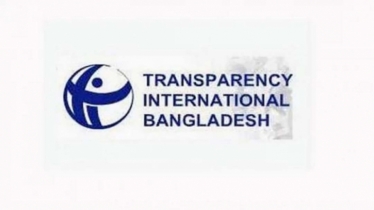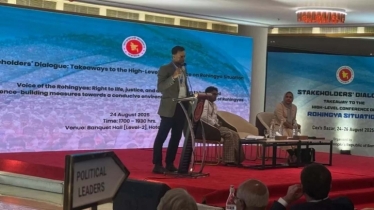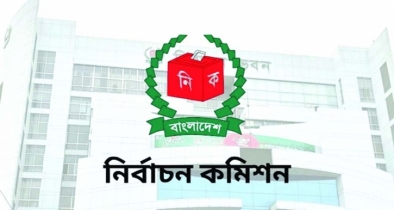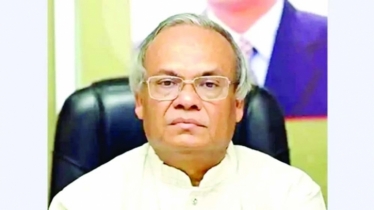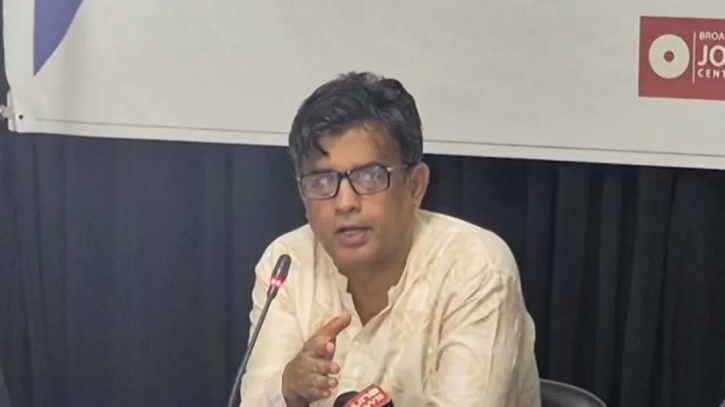
Chief Adviser’s Press Secretary Shafiqul Alam on Sunday described the recent outcome of tariff negotiations with the United States—securing a 20% tariff—as one of the interim government’s major achievements.
“This negotiation was the government’s biggest foreign policy-related challenge, but with the right preparation and confidence, Bangladesh has achieved the desired outcome,” he said at a roundtable discussion held at the Daily Star Bhaban in Farmgate on Sunday morning.
The event titled “Bangladesh and Trump tariffs: Economic diplomacy in a world after trade regime” was organized by Bangladesh Research Analysis and Information Network (BRAIN). Dhaka University Professor Dr Rashed Al Mahmud Titumir and economists Jyoti Rahman and Zia Hasan were among the speakers.
Shafiqul Alam said: “Many claimed that the interim government is weak, inexperienced, and incapable of securing a good deal with the US. But we have proven that with proper preparation and self-confidence, even an interim government can achieve a major success.”
He explained that from the outset, the government was aware of its interim nature and therefore focused on areas where realistic and immediate results could be achieved.
“We were confident from the very beginning that a good agreement with the United States was possible,” the press secretary added.
Shafiqul Alam noted that Bangladesh faced tough challenges both on the Rohingya issue and the US tariff policies.
“Though the media of a neighboring country widely circulated misleading information soon after the interim government assumed office, Bangladesh managed to counter this through accurate diplomatic preparations,” he said.
He said that during a visit to the US, National Security Adviser Dr Khalilur Rahman realized that the Trump administration was diverging from global consensus and adopting a unilateral tariff policy.
Following that visit, Bangladesh took necessary preparations. Three main strengths drove the negotiations-- Chief Adviser Professor Muhammad Yunus’ personal connections and credibility in the US, Dr Khalilur Rahman’s long-standing experience, and Commerce Adviser Sk Bashir Uddin’s clear insights into global markets, he said.
Shafiqul Alam added that Bangladesh’s main advantage lies in its position as a major consumer and importer in the global market.
“Cotton, oil, poultry feed, or edible oil—Bangladesh is now a significant player in almost every sector. This reality was used as leverage in the negotiations,” he explained.
He said that alongside the US, Bangladesh’s exports to Japan, South Korea, Brazil, South Africa, and the Middle East are also increasing rapidly.
“While success was achieved in talks with the US, the government is simultaneously working to diversify markets,” he added.
Noting that making Chittagong Port more efficient and reforming the logistics system are prerequisites for increasing foreign investment, Shafiqul Alam said: “If Chittagong Port can be made as efficient as Singapore’s, foreign investment cannot be stopped.”
He said the interim government’s steps so far have helped bring inflation under control, increase foreign exchange reserves, and restore stability to the economy.
“We may not have achieved 8% growth, but achieving 4% growth in this post-uprising period is not insignificant,” he said.
Expressing optimism, Shafiqul Alam said the success of the tariff negotiations has placed Bangladesh’s economy on a new platform for prosperity, and trade ties with the US will deepen further.
“We want more access to the vast US market. Like Japan, South Korea, Taiwan, or Vietnam, we too believe that by expanding exports to the US, Bangladesh will advance towards a new path of prosperity,” he added.


